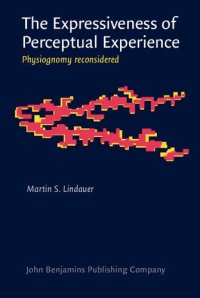
Ebook: The Expressiveness of Perceptual Experience: Physiognomy reconsidered
Author: Martin S. Lindauer
- Tags: Emotions Mental Health Fitness Dieting Religion Spirituality Agnosticism Atheism Buddhism Hinduism Islam Judaism Literature Fiction New Age Occult Paranormal Other Eastern Religions Sacred Texts Practices Religious Art Studies Worship Devotion Psychology Clinical Cognitive Developmental Neuropsychology Psychopathology Psychotherapy Social Sciences Used Rental Textbooks Specialty Boutique
- Series: Consciousness & Emotion Book Series
- Year: 2013
- Publisher: John Benjamins Publishing Company
- Language: English
- pdf
A face strikes us immediately as sad, and so, too, do a mourner, a willow tree, a house on a prairie, and a group of onlookers. The spontaneous emergence of affective and other qualities of people, things, places, and events falls under the heading of physiognomy, a phenomenon discussed since at least Aristotle, and a key feature of evolutionary theory, psychology, and perception as well as professional practice (“profiling”) and popular talk. However, physiognomy is a controversial topic because of a suspect history, and is often renamed as non-verbal communication.
The Expressiveness of Perceptual Experience: Physiognomy Reconsidered examines this venerable, attractive, and contentious topic within the unique perspective of research-oriented psychology. Included are the processes involved, primarily perceptual; origins, mainly evolutionary; and social-cultural factors as supplements. Discussed within a holistic-experiential (phenomenological)-aesthetic framework are physiognomy’s ties to the arts as well as emotions, synesthesia, learning, development, and personality. Empirical investigations are summarized, including the author’s.
The Expressiveness of Perceptual Experience: Physiognomy Reconsidered examines this venerable, attractive, and contentious topic within the unique perspective of research-oriented psychology. Included are the processes involved, primarily perceptual; origins, mainly evolutionary; and social-cultural factors as supplements. Discussed within a holistic-experiential (phenomenological)-aesthetic framework are physiognomy’s ties to the arts as well as emotions, synesthesia, learning, development, and personality. Empirical investigations are summarized, including the author’s.
Download the book The Expressiveness of Perceptual Experience: Physiognomy reconsidered for free or read online
Continue reading on any device:

Last viewed books
Related books
{related-news}
Comments (0)